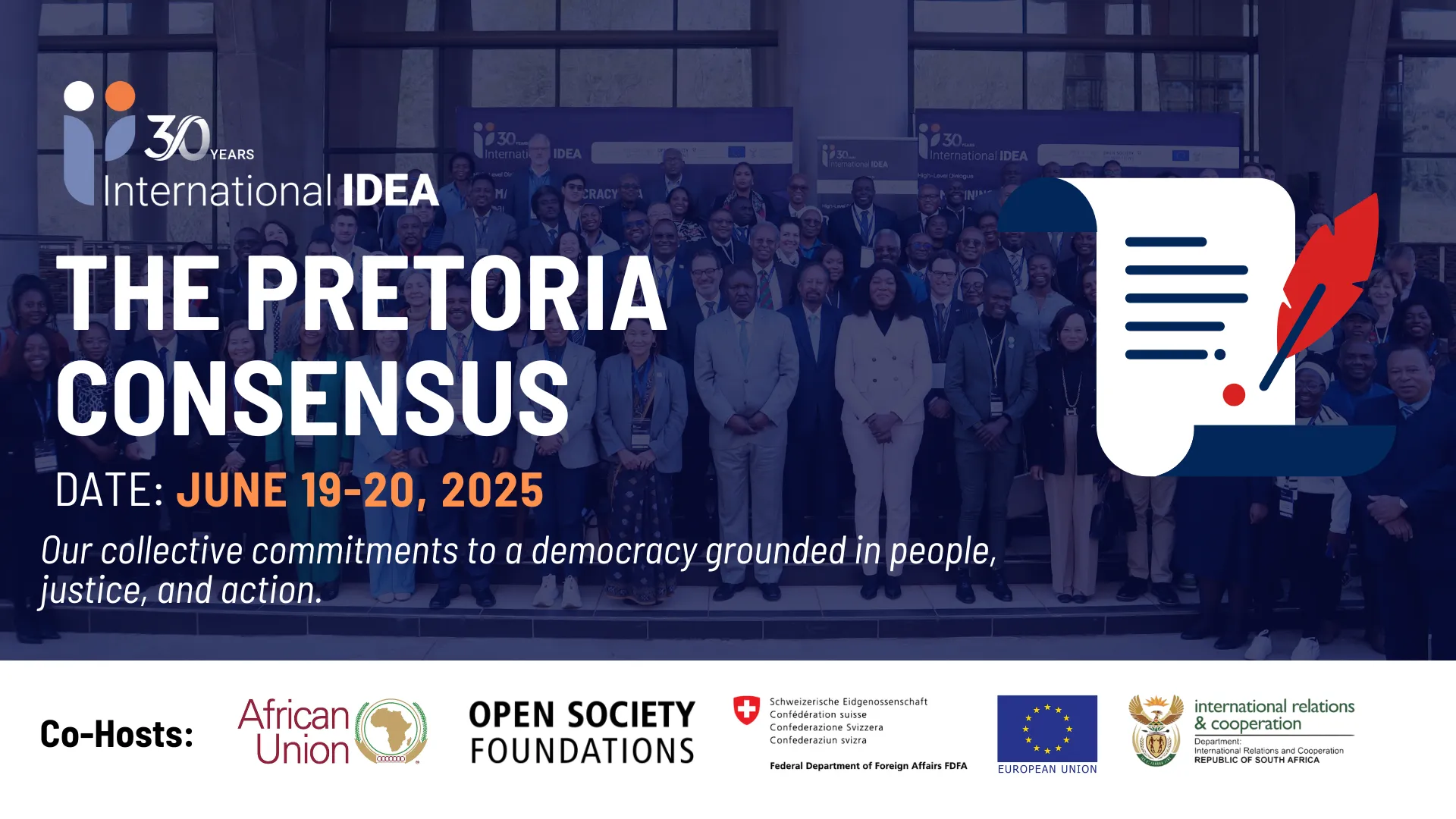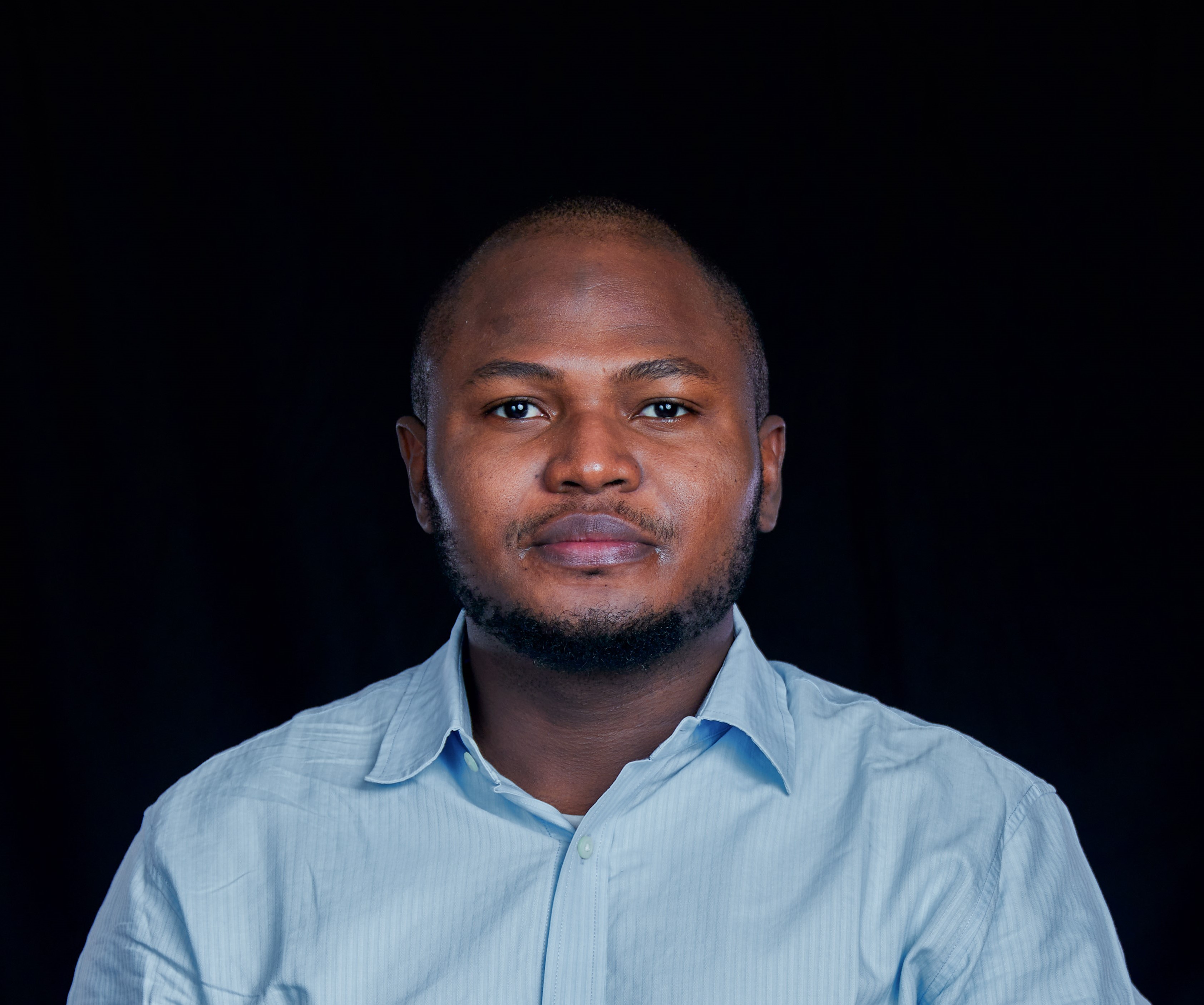The Pretoria Consensus: Re-imagining democracy in Africa and the Global South

Preamble
In an era marked by the erosion of democratic norms, rising authoritarian resurgence, and increasing public disaffection with electoral politics, the imperative to safeguard and revitalize democratic governance has become more urgent than ever. Against this backdrop, over 200 stakeholders from across Africa and the broader Global South convened in Pretoria, South Africa, from 19–20 June 2025, for a High-Level Dialogue under the theme: “Re-imagining Democracy in Africa: Comparative Experiences from the Global South.”
The dialogue, co-hosted by International IDEA, and the Open Society Foundations, the African Union, the Department of International Relations and Cooperation (DIRCO) of South Africa with the support from the European Union, the Swiss Agency for Development and Cooperation (SDC), and the Netherlands Ministry of Foreign Affairs marked a significant milestone in building a South-south platform to strengthen democracy.
Held at the prestigious DIRCO Conference Centre in Pretoria, the convening brought together parliamentarians, judicial officers, managers of electoral bodies, representatives of regional economic communities, policymakers, civil society actors, social activists, and media representatives from Africa, Asia Pacific and Latin America. Their reflective insights culminated in a bold statement for democratic transformation: Pretoria Consensus.
The Pretoria Consensus
The Pretoria Consensus articulates a collective commitment to reimagining democracy in Africa and the Global South—grounded in historical consciousness, local knowledge systems, participatory governance, and inclusive policy innovation. While many countries in the Global South have embraced formal democratic structures, there persists a profound disconnection between electoral performance and citizens’ substantive experience of democratic governance.
The Consensus affirms the need for democracy to move beyond its procedural expressions—elections and institutions—towards delivering on justice, equity, and development. It asserts that democracy must be reconstructed through a decolonial, people-centred lens, one that draws from indigenous value systems, fosters inclusive governance, and rebuilds social contracts rooted in legitimacy and accountability.
Key pillars of the Pretoria Consensus
- A shift from procedural to substantive democracy: Democratic legitimacy must be based not only on regular elections but also on delivering social justice, economic inclusion, and development, especially for the most marginalized groups such as women and youth.
- Inclusive governance as a democratic imperative: The meaningful participation of women, youth, persons with disabilities, and minorities must be institutionalized as a right, not extended as political charity.
- Reclaiming and renewing the social contract: A democratic renewal must rebuild trust between citizens and state, grounded in equality, public accountability, responsive service delivery and inclusive policy-making.
- Strengthening electoral systems and democratic institutions: There is a need for continued reform, civic education, electoral justice, and technological safeguards to protect the integrity of democratic processes.
- Consolidating regional solidarity platforms: Regional organisations (including the African Union), along with civil society networks, must be empowered and resourced to proactively address democratic erosion, unconstitutional changes of government, and human rights violations.
- Democratising responses to global challenges: The governance of climate change, digital disruption, artificial intelligence, and critical mineral governance necessitate responses grounded in transparency, intergenerational equity, justice, and citizen engagement.
- Protection for multilateralism and a call for reform of the global economic and governance architecture: At a time with there is an onslaught on global institutions by unilateral national actors and crippling there is need for renewed commitments to protect multilateral institutions – through informed reform to ensure the voice of Global South nations are enhanced and their roles empowered.
Proposed Actions Moving Forward
Building on the momentum of the Pretoria Consensus, several forward-looking actions were proposed to translate this vision into concrete impact:
1. Building coalitions for democratic innovation across the Global South
Strengthen South-South partnerships to showcase and to advance shared learning, joint advocacy, and collaborative research on emergent democratic models and practices.
2. Investing in civic-led climate and digital governance
Support youth- and women-led grassroots organisations in spearheading democratic responses to the climate crisis, environmental justice, and control over digital and information ecosystems. Such investments will strengthen democratic resilience, economic justice, and sustainability at the community level.
3. Advancing South–South research and policy engagement
Expand the comparative insights generated through the Dialogue into academic research, policy briefs, and thought leadership outputs. These will inform governance reforms, support evidence-based advocacy, and foster intellectual exchanges across the Global South.
4. Follow-up forums and accountability mechanisms
Establish an engagement and monitoring platform to gauge progress in actualizing the Pretoria Consensus and to open spaces for more inclusive dialogues on deepening democracy through South–South exchanges. A follow-up High-Level Dialogue, anticipated in 2026, will assess implementation and chart further pathways forward.
The Pretoria Consensus underscored the indispensable role of multilateralism in advancing democratic governance across the Global South. Participants called for stronger cooperation between regional and international institutions to safeguard civic space, uphold constitutional order, and respond to emerging threats to democracy. It was noted that Africa’s leadership within multilateral platforms—such as the African Union and the upcoming South African G20 Presidency—offers a strategic opportunity to elevate the continent’s voice, shape global norms, and foster South–South solidarity rooted in justice, equity, and people-centred development.
It also affirms a renewed commitment to building democratic futures that are inclusive, just, and reflective of the lived realities of the peoples of the Global South. At a time when democracy is being tested by overlapping political, economic, and climate crises, the High-Level Dialogue in Pretoria offered a timely and strategic platform for a collective recommitment: to reimagine democracy so that it delivers—not just procedurally, but substantively—for all.
Pretoria, 20 June 2025.




